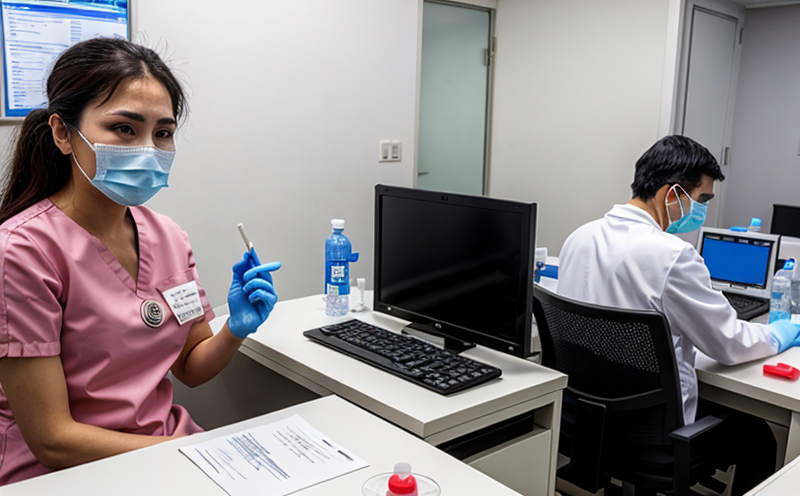African Swine Fever Virus PCR Testing in Swine
The African Swine Fever virus (ASFV) poses a significant threat to global pig populations and livelihoods. This highly contagious viral infection can spread rapidly within and between swine herds, causing high mortality rates and substantial economic losses for the agriculture sector. Accurate diagnosis is crucial for preventing further outbreaks, managing infected populations, and implementing effective control measures.
PCR testing represents a pivotal tool in the diagnostic toolkit of virology and serology. Polymerase Chain Reaction (PCR) technology amplifies specific segments of viral DNA, enabling precise detection even at low concentrations. This method offers unparalleled sensitivity, allowing for early diagnosis and subsequent containment strategies. The process involves several critical steps:
- Sample collection: Nasal swabs or blood samples are collected from affected pigs.
- Transportation: Samples must be handled under controlled conditions to maintain integrity.
- DNA extraction: Viral DNA is isolated using chemical or mechanical means.
- PCR amplification: Specific primers target the ASFV genome for amplification.
- Detection and quantification: Amplified products are analyzed using real-time PCR technology.
The testing process is designed to be both rapid and reliable, providing results within 24-48 hours. This speed facilitates timely interventions, such as culling or quarantine, which can significantly reduce the spread of the virus. Laboratories equipped with advanced molecular biology techniques ensure accurate diagnosis, supporting effective management strategies.
Compliance with international standards is essential for ensuring reliable test outcomes. The ISO 15189 standard provides guidelines for quality and competence in medical laboratories, while the ASTM E2318-16 specifies procedures for sample preparation. Adherence to these standards ensures that PCR testing remains a robust and dependable diagnostic tool.
In conclusion, African Swine Fever Virus PCR Testing in Swine is an indispensable service for the agricultural sector. It plays a critical role in safeguarding pig populations by enabling early detection and rapid response measures. By leveraging this technology, stakeholders can contribute to reducing economic losses and protecting public health.
Industry Applications
| Application | Description |
|---|---|
| Veterinary Surveillance Programs | PCR tests are used to monitor pig herds for the presence of ASFV, ensuring compliance with international health standards. |
| Epidemiological Studies | Testing helps track the spread and evolution of the virus within and between regions. |
| Biosecurity Measures | Detection in imported animals aids in preventing introductions into disease-free zones. |
| Research and Development | PCR enables researchers to study viral genetics, develop vaccines, and explore new therapeutic approaches. |
| Animal Welfare | Early detection allows for humane culling of affected animals before widespread infection occurs. |
The versatility of PCR testing extends beyond immediate diagnostic purposes. By integrating these tests into broader veterinary and epidemiological frameworks, stakeholders can enhance their understanding of ASFV dynamics, thereby contributing to more effective control strategies.
Why Choose This Test
African Swine Fever Virus PCR Testing in Swine is a preferred diagnostic method for several compelling reasons:
- High Sensitivity and Specificity: PCR tests can detect the virus at very low concentrations, ensuring accurate results.
- Rapid Results: The testing process typically yields results within 24-48 hours, allowing for prompt intervention measures.
- Non-Invasive Sample Collection: Nasal swabs and blood samples are easy to collect without causing undue stress to the animals.
- Comprehensive Data: Real-time PCR provides both qualitative and quantitative data, offering a complete picture of infection levels.
- International Compliance: Adherence to international standards ensures reliable test outcomes.
- Cost-Effective: Although initial setup costs can be high, the long-term benefits outweigh these expenses.
The combination of these factors makes PCR testing an essential tool for managing African Swine Fever in swine populations. By choosing this service, stakeholders contribute to a safer and more resilient agricultural sector.
Environmental and Sustainability Contributions
- Economic Stability: Early detection prevents widespread outbreaks, reducing economic losses for farmers and the broader economy.
- Biodiversity Preservation: Controlling the spread of ASFV helps protect diverse ecosystems dependent on pig farming.
- Sustainable Agriculture Practices: Effective management strategies support sustainable agricultural practices by minimizing environmental impact.
- Ethical Considerations: Humane culling practices underpinned by accurate PCR testing promote ethical animal welfare standards.
The adoption of African Swine Fever Virus PCR Testing in Swine aligns with broader sustainability goals, contributing to a more resilient and responsible agricultural sector. By supporting these efforts, laboratories play a vital role in safeguarding public health and the environment.





